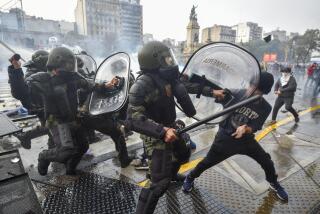Bank Freeze Brings Standstill
BUENOS AIRES — Argentines combed the streets for the few ATMs that were still dispensing cash Monday, the first day of an indefinite bank holiday ordered to prevent a collapse of the country’s financial system.
The government, warned by the International Monetary Fund again this weekend that it must stop runaway spending to merit desperately needed aid, rushed a bill to Congress to convert bank deposits into government bonds.
The aim of the vastly unpopular plan is to halt withdrawals of cash from banks by depositors panicked by a tumbling currency and the specter of more political and economic chaos, with a four-year recession showing no sign of ending.
Latin America’s No. 3 economy is in total disarray after a 10-year currency peg--which fixed the peso at one to the dollar by law--was scrapped in January. Credit has dried up since Argentina defaulted on its sovereign debt.
“The bond switch is definitely the lesser of two evils since the alternative was a total collapse,” said a Wall Street banking analyst. “This may save the banks. It’s just a shame that the government took so long to do the inevitable.”
The peso has now fallen to over 3.0 to the dollar and currency fears have brought soaring inflation to a population of 36 million people that expresses its anger in daily protests against politicians widely seen as corrupt and ineffective.
The main parties of Congress have promised to pass the main points of the bill, which would allow banks to return an estimated 60% of savings in bonds rather than cash.
Small opposition parties planning to vote against it accused the government of “blackmail” for forcing Congress to rush through the bill or answer for chaos in the real economy.
More to Read
Sign up for Essential California
The most important California stories and recommendations in your inbox every morning.
You may occasionally receive promotional content from the Los Angeles Times.










